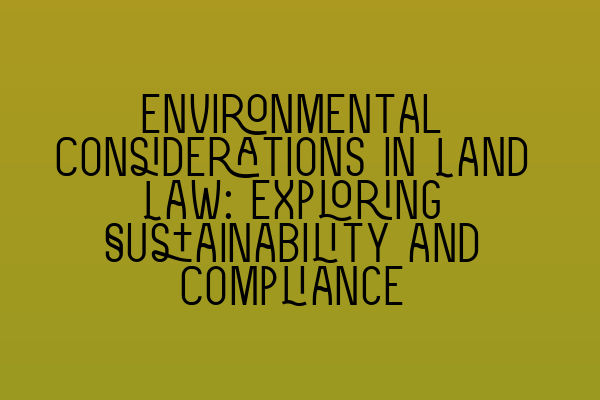Environmental Considerations in Land Law: Exploring Sustainability and Compliance
In today’s world, it is more important than ever to consider the environmental impact of our actions and decisions. This is particularly true in the field of land law, where the use and development of land can have significant environmental consequences. In this blog post, we will explore the importance of environmental considerations in land law, focusing on sustainability and compliance.
Sustainability is a concept that is gaining increasing attention across various sectors, including property and land law. Sustainable development seeks to meet the needs of the present generation without compromising the ability of future generations to meet their own needs. When it comes to land law, sustainable development means considering the long-term environmental, social, and economic impacts of land use.
One key aspect of sustainability in land law is the preservation and conservation of natural resources. This includes protecting biodiversity, preventing soil erosion, and conserving water resources. For example, when purchasing or developing land, it is important to assess the impact on local habitats and wildlife. This can involve conducting environmental impact assessments and implementing measures to mitigate any negative effects.
Compliance with environmental regulations is another vital aspect of land law. Governments and regulatory bodies have established a range of laws and regulations aimed at protecting the environment and promoting sustainable development. These regulations cover various areas such as air and water pollution, waste management, and noise control. It is essential for property owners, developers, and land law professionals to be knowledgeable about these regulations and ensure compliance in order to avoid legal issues and potential penalties.
Additionally, sustainability and compliance considerations can have a significant impact on the value and marketability of a property. Increasingly, buyers and investors are looking for properties that have been developed or managed in an environmentally responsible manner. This includes the use of sustainable building materials, energy-efficient design, and the implementation of green technologies. By incorporating these factors into land law practices, property owners and developers can enhance the value and desirability of their assets.
Moreover, sustainable land use practices can also provide financial benefits in the long run. For example, energy-efficient buildings can lead to reduced operating costs, while green infrastructure such as rainwater harvesting systems can help save on water bills. Additionally, sustainable development initiatives can attract government grants and incentives, further enhancing the financial viability of projects.
In conclusion, environmental considerations play a crucial role in land law, and it is essential for property owners, developers, and land law professionals to prioritize sustainability and compliance. By taking into account the long-term environmental impact of land use, preserving natural resources, and complying with relevant regulations, we can ensure a more sustainable and environmentally responsible approach to land development. This not only benefits the environment but also enhances the value and marketability of properties. For more information on related topics, please check out our articles below:
– SQE 1 Practice Exam Questions
– SQE 1 Practice Mocks FLK1 FLK2
– SQE 2 Preparation Courses
– SQE 1 Preparation Courses
– SRA SQE Exam Dates
At SQE Property Law & Land Law, we are committed to providing our clients with expert advice and assistance in navigating the complexities of land law while promoting sustainable and environmentally responsible practices. Contact us today to learn more about how we can help you achieve your property goals while respecting the environment.
